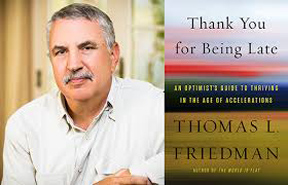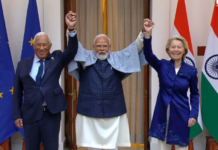 NEW DELHI: In a piquant diagnosis, celebrated author and journalist Thomas Friedman warns that the world has entered a “dizzying” and unprecedented “age of accelerations” which is transforming every aspect of modern life while making people “fearful or unmoored”.
NEW DELHI: In a piquant diagnosis, celebrated author and journalist Thomas Friedman warns that the world has entered a “dizzying” and unprecedented “age of accelerations” which is transforming every aspect of modern life while making people “fearful or unmoored”.
The three-time Pulitzer Prize winner in his new book “Thank You For Being Late: An Optimist’s Guide to Thriving in the Age of Accelerations” builds a convincing case to make sense of why the world is the way it is today and which are the “biggest forces” driving it.
Published by Penguin, the 453-page book, which is a work of contemporary history, records the “tectonic movements” that are reshaping the world today and informs how to get the most out of them as well as “cushion their worst impacts.”
“We all sense it – something big is going on. You feel it in your workplace. You feel it when you talk to your children.
You can’t miss it when you read the newspapers or watch the news. Our lives are speeding up – and it is dizzying,” Friedman writes.
He argues that to comprehend the twenty-first century, one needs to understand that the planet’s three major forces Moore’s law (technology), the Market (globalization) and Mother Nature (climate change and biodiversity loss) are accelerating simultaneously and together constitute the “age of accelerations”.
“It’s no surprise that so many people feel fearful or unmoored these days. We are living through one of the greatest inflection points in history. The three largest forces on the planet – technology, globalization, and climate change – are all accelerating at once.
“As a result many aspects of our societies, workplaces, and geopolitics are being reshaped and need to be reimagined,” he notes.
Friedman asserts that there is a “mismatch” between the change in the pace of change and our ability to develop the learning, training, management and social systems and social safety nets as well as government regulations that would enable the citizens to get the most out of these accelerations.
“This mismatch is at the center of much of the turmoil roiling politics and society in both developed and developing countries today. It now constitutes probably the most important government challenge across the globe,” he affirms.
The columnist, who is read from small business owners to US president Barack Obama, emphasizes that the exponential increase in computing power, defined by Moore’s law primarily lies at the heart of the era of accelerations the mankind is living through today.
Terming 2007 as a technological “turning point”, Friedman states that the year saw the arrival of the iPhone, Android and Kindle, coupled with advances in storage, sensors and networking which created a new technology platform.
He describes this platform as “the supernova” for its extraordinary release of energy that is reshaping everything and is, in the words of Netscape’s founder Marc Andreesen, “eating the world”.
“There are vintage years in wine and vintage years in history, and 2007 was definitely one of the latter. Because not just the iPhone emerged in 2007 – a whole group of companies emerged in and around that year. Together these new companies and innovations have reshaped how people and machines communicate, create, collaborate and think,” he writes.
Friedman suggests that even as the world is changing rapidly, it becomes more imperative today than ever before to keep constantly learning in order to stay “relevant”.
“Anyone who falls back on tried-and-true formulae or dogmatism in a world changing this fast is asking for trouble.
Indeed, as the world becomes more interdependent and complex, it becomes vital than ever to widen your aperture and to synthesize more perspectives,” he notes.
Describing it as “one giant column” about the world today, ‘Thank You For Being Late’ is Friedman’s most ambitious book and a field guide to the present and the future.
It is also an argument for “being late”, for pausing to appreciate this amazing historical epoch people are passing through and reflecting on its possibilities and dangers.
Steering clear of cynicism, Friedman cogently argues that one can overcome the multiple stresses of this age of accelerations, if they slow down and dare to be late and use the time to reimagine work, politics and community.
“Opting to pause and reflect, rather than panic or withdraw, is a necessity. It is not a luxury or a distraction – it is a way to increase the odds that you will better understand, and engage productively with, the world around you,” he declares.
Friedman shows us how we can anchor ourselves as individuals in the eye of this storm, and how communities can create a ‘topsoil of trust’ to do the same of their increasingly diverse and digital populations.
Written with his trademark vitality, wit and optimism, ‘Thank You For Being Late’ is a required reading for a generation that is “going to be asked to dance in a hurricane.” –PTI






